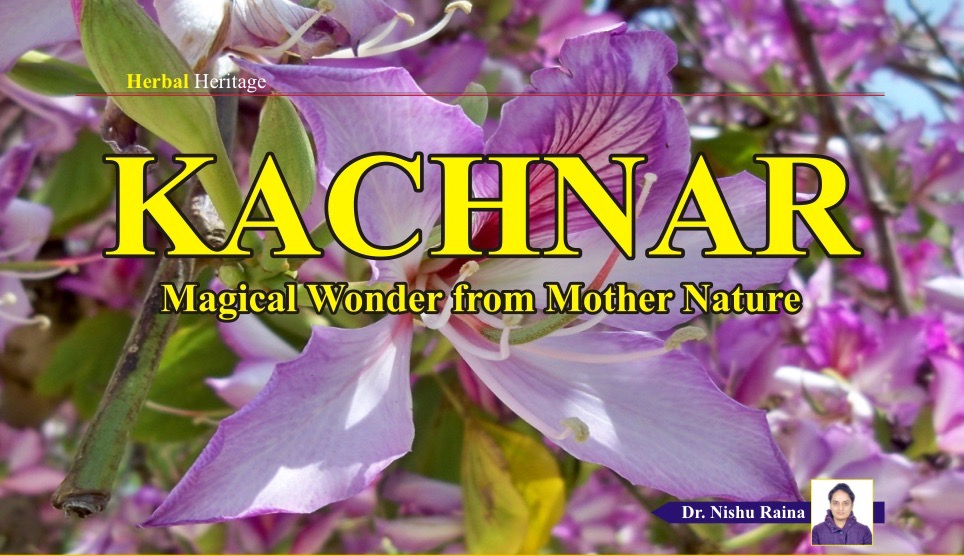Kachnar is abundant in minerals like calcium, potassium and magnesium, contributing to bone health, electrolyte balance and muscle function.
Kachnar is truly a magical wonder from mother nature, scientifically known as Bauhinia variegate and known by many other ancient names including Kanchanara, Gandari and Yugapatraka. It is also known as Mountain Ebony, Butterfly Ash, Camel’s Foot in English. It is a deciduous tree, native to the Southeast Asian countries of India, Sri Lanka and China.
It is generally medium in size, growing up to a height of 10 to 12 meters, with thick bark and lengthy stems. The branches hold leaves that stretch up to 10 to 20 centimetres in size, being rather broad, having two rounded lobes each at the base and tip. Kachnar, a medicinal tree is well practised in Indian indigenous health science-Ayurveda. It’s bark is used in disorders like lymphadenopathy, goitre, tumors and prostate hypertrophy. While flowers have pitta pacifying action thus cures dysfunctional uterine bleeding. All parts of the kachnar tree, namely the roots, bark, stems, leaves, flowers and seeds are packed with beneficial nutrients and medicinal compounds that confer astounding merits for overall wellbeing.
Nutrition Values
Kanchnar contains ample amounts of vitamin C & B, calcium, phosphorous, magnesium, iron, zinc, dietary fiber, proteins and healthy unsaturated fats. It also showcases an impressive profile of bioactive phytonutrients with anti-inflammatory, antimicrobial, antihyperglycemic, anti-arthritic and cancer-reducing properties.
HEALTH BENEFITS
Obesity
Kachnar eases the assimilation of foodstuffs in the body, regulates the three doshas, improve metabolism and promote weight loss.
Diabetes
Controls insulin mechanism in the body and brings down rising blood glucose levels. In this manner, Kanchnar assists in mitigating diabetes symptoms and keeping blood sugar levels in check.
Piles
It is imbued with compounds that stimulate the digestive juices. Since rampant indigestion and constipation trigger inflammation in the veins of the rectum, resulting in itching, pain, bleeding during the elimination of wastes. It relieves pain & swelling in the rectum and ceases the occurrence of piles.
Hypothyroidism
Hypothyroidism occurs when the thyroid gland does not synthesize adequate quantities of thyroid hormones, which play a crucial role in conserving metabolism and immunity in the body. Since conditions like obesity and hampered digestion processes prompt thyroid problems, taking kanchnar decoction and powder assists in treating hypothyroidism.
Diarrhoea
This occurs owing to an agitated Vata dosha, resulting in frequent excretion of loose stools, apart from discomforting symptoms of fatigue and dehydration. Bestowed with vata-balancing characteristics, Kachnar successfully cures diarrhoea and preserves normal bowel and bladder functions.
Menstrual Issues
Menstruation related problems like dysmenorrhea or amenorrhea can be alleviated by taking kachnar decoction. This is because kachnar is packed with cooling traits, besides an inherent ability to control pitta dosha, thereby assuring timely, normal menstrual cycles.
Kachnar Kadha Preparation
Making Kachnar Kadha is a simple process that involves brewing Kachnar bark or flowers in water along with other herbs.
Ingredients
• Two teaspoons of dried coarse Kachnar bark powder
• 2 cups of water
• Optional: herbs such as ginger, cinnamon, cardamom or cloves.
Steps-Start by bringing the water to a boil in a saucepan or pot.
• Once the water reaches a boil, add the dried Kachnar bark to the water and reduce the heat to low and let the mixture simmer for about 10-15 minutes.
• If desired, can add other herbs to the kadha during the simmering process to enhance the flavor and health benefits.
• After simmering, remove the kadha from the heat and strain out the Kachnar bark and any other added ingredients.
• Pour the strained kadha into a cup and let it cool before drinking.
• One can sweeten the kadha with honey or maple syrup.
• Enjoy homemade Kachnar Kadha as a soothing and nourishing herbal beverage.
Kachnar is indeed a versatile herb. It can be consumed as food in measured amounts by incorporating into the routine diet, as staple indian dishes of curry and achaar. Besides, it delivers magnificent curative traits as a medicinal aid for thyroid complications, indigestion, irregular menstrual cycles and healing a host of health woes, to ensure optimal wellbeing.
Dr. Nishu Raina
Associate Professor Kayachikitsa
Dayanand Ayurvedic College, Jalandhar.
nishu.raina2010@gmail.com







 Dec 2024
Dec 2024
 May 2024
May 2024
 September 2022
September 2022
 April 2022
April 2022
 October 2020
October 2020
 Jan 2020
Jan 2020
 June 2019
June 2019
 January-February 2019
January-February 2019
 Augest-September
Augest-September
 April 2018
April 2018
 November 2017
November 2017
 June 2017
June 2017
 November 2016
November 2016
 September 2015
September 2015
 March 2015
March 2015
 July 2014
July 2014
 January 2014
January 2014
 July2013
July2013
 March 2013
March 2013
 May 2012
May 2012
 May 2011
May 2011
 Sep 2010
Sep 2010
 Jun 2010
Jun 2010
 Feb 2010
Feb 2010
 December 2009
December 2009
 August 2009
August 2009
 June 2009
June 2009
 Feb 2009
Feb 2009
 December 2008
December 2008
 October 2008
October 2008
 March 2008
March 2008
 July 2008
July 2008
 May 2008
May 2008